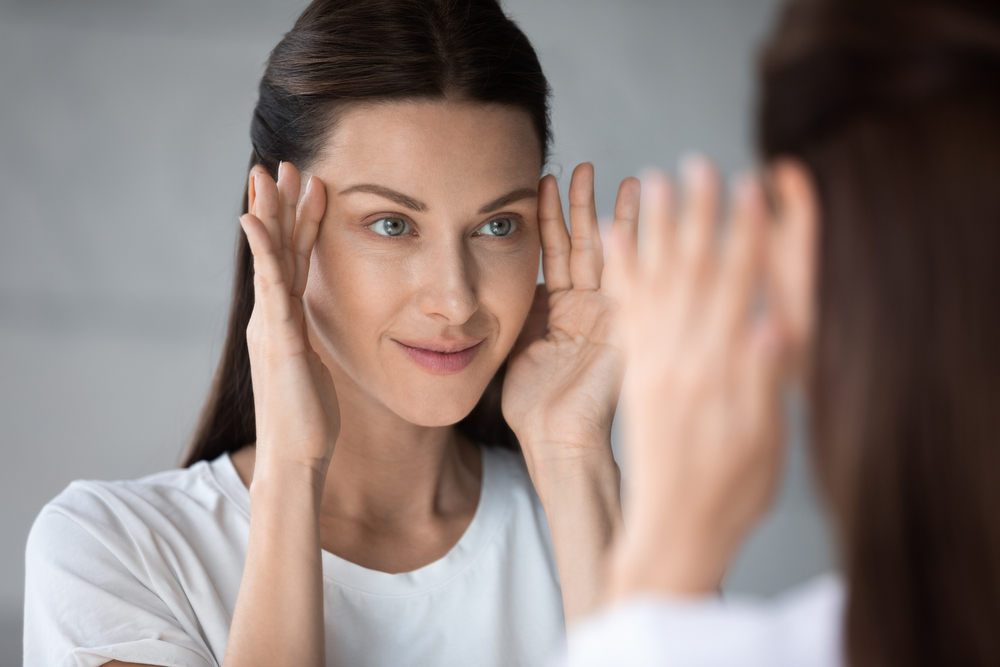The sensation of dry eyes is one that many of us have experienced at some point in our lives. It’s an uncomfortable feeling that can range from mild irritation to downright pain. However, we have a solution: eye massage for dry eyes.
Dry eyes can affect anyone, regardless of age or gender, and can be caused by a variety of factors.
In this blog, we will explore the causes behind this common ailment and offer a 5-step soothing eye massage technique to provide relief. Additionally, we will discuss natural ways to manage dry eyes effectively.
Table of Contents
How Do Having Dry Eyes Feel Like?
Imagine the feeling of gritty sandpaper scraping against your eyes or the sensation of having a foreign object trapped beneath your eyelids. That’s what having dry eyes can often feel like.
Studies show dry eyes occur when your eyes fail to produce enough tears or when the quality of the tears is compromised.
Tears play a crucial role in maintaining the health and comfort of your eyes, and when this delicate balance is disrupted, discomfort ensues.
Why Do You Get Dry Eyes?
Dry eyes can occur due to many reasons, such as:
Environmental Factors
Dry eyes can often be attributed to environmental factors. Prolonged exposure to dry, windy conditions, excessive air conditioning or heating, and high altitudes can all contribute to increased evaporation of tears, leaving your eyes parched and uncomfortable.
Suggested Read: How to Manage Dry Eyes During Pregnancy?
Aging
As we grow older, the production of tears tends to decrease. This natural aging process can lead to an increased risk of dry eyes, making it a common condition among the elderly.
Digital Devices
In today’s digital age, we spend countless hours staring at screens, be it computers, smartphones, or tablets.
This prolonged screen time can reduce our blink rate, causing our eyes to become dry and irritated.
Suggested Read: How to Take a Digital Detox for Phone Addiction Symptoms?
Medical Conditions
Certain medical conditions, such as autoimmune disorders (like Sjögren’s syndrome), diabetes, and thyroid disorders, can interfere with tear production and quality, contributing to dry eyes.
Medications
Some medications, including antihistamines, decongestants, and antidepressants, can cause dry eyes as a side effect. If you suspect your medication is causing dry eyes, consult your healthcare provider for alternatives.
Ophthalmologist Recommendation: Dr. Muhammad Saad Aziz is a qualified eye specialist based in Lahore. With an experience of around 9 years in the field, he can effectively treat all sorts of eye issues.
The 5-Step Soothing Eye Massage for Dry Eyes
Now that we’ve explored the causes of dry eyes, let’s discuss a 5-step soothing eye massage technique that can provide relief:
Step 1: Clean Hands and Environment
Start by ensuring that your hands are clean. Wash them thoroughly with soap and water. Find a quiet, comfortable place where you can sit or lie down without distractions.
Step 2: Warm Compress
Soak a clean cloth in warm water, wring out the excess water, and place it over your closed eyelids. Leave it there for about 5 minutes. The warmth will help loosen up the oils in your eyelid glands, which can improve the quality of your tears.
Step 3: Gentle Eyelid Massage
After the warm compress, use your index finger to gently massage your upper and lower eyelids. Start from the inner corner and move outwards in a circular motion. Repeat this massage for about 30 seconds on each eyelid.
Step 4: Blinking Exercise
Open your eyes and blink rapidly for about 20 seconds. This exercise helps distribute the tears more evenly across the surface of your eyes.
Step 5: Lubricating Eye Drops
Finish the massage by applying preservative-free lubricating eye drops. These drops can provide instant relief by adding moisture to your eyes. Make sure to choose drops recommended by your eye doctor.
Natural Ways to Manage Dry Eyes
While the soothing eye massage is a great way to relieve dry eye symptoms, there are also several natural approaches to managing and preventing dry eyes:
- Stay Hydrated: Drinking plenty of water helps maintain overall body hydration, which can also benefit your eyes.
- Follow the 20-20-20 Rule: When working on a computer or any digital device, take a 20-second break every 20 minutes and look at something 20 feet away. This reduces eye strain and encourages blinking.
- Use a Humidifier: If you live in a dry climate or use heating or air conditioning, a humidifier can add moisture to the air, preventing your eyes from drying out.
- Omega-3 Fatty Acids: Incorporate foods rich in omega-3 fatty acids into your diet, such as salmon, flaxseeds, and walnuts. These nutrients can help improve the quality of your tears.
- Avoid Smoke and Wind: Smoke and windy conditions can exacerbate dry eyes. Try to avoid direct exposure to these environmental factors whenever possible.
- Proper Eyewear: If you wear contact lenses, ensure they are well-fitted and clean. Additionally, consider wearing wrap-around sunglasses to protect your eyes from wind and dust.
- Limit Screen Time: Reduce your screen time, especially before bedtime. The blue light emitted by screens can disrupt your sleep patterns and exacerbate dry eye symptoms.
When to Visit an Ophthalmologist for Dry Eyes?
Dry eyes can be an uncomfortable and frustrating condition to deal with, but with the right knowledge and techniques, you can find relief and manage the symptoms effectively.
The 5-step soothing eye massage for dry eyes, coupled with natural approaches to maintain eye health, can make a difference in your comfort and overall eye well-being.
If you continue to experience severe or persistent dry eye symptoms, it’s essential to consult with an eye care professional for a comprehensive evaluation and personalized treatment plan.
Remember, your eyes deserve the best care, and by following these steps, you can help them stay healthy and comfortable.
Reach out to a qualified ophthalmologist for an eye exam.
